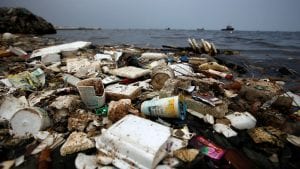WHOI in the News
Global heating supercharging Indian Ocean climate system
Global heating is “supercharging” an increasingly dangerous climate mechanism in the Indian Ocean that has played a role in disasters this year including bushfires in Australia and floods in Africa.
Scientists meeting in Portland say right whales on the way to extinction
The future continues to grow ever darker for the highly endangered right whale, a species that has been in decline every year since 2010 and is at the heart of regulatory protection efforts threatening to upend Maine’s valuable lobster fishery.
A Tiny Camera Could Help Shellfish Farmers Avoid Big Losses
Cape Cod’s shellfish farmers face many challenges, and one of the biggest is dealing with harmful algal blooms, which can damage shellfish and be poisonous for humans to ingest. But a new project at the Woods Hole Oceanographic Institution is looking at a way to better manage this with the help of a tiny camera.
Toxic Algal Blooms Are Worsening with Climate Change
“Cyanobacteria grow quite well—better than almost everything else in those freshwater systems—the hotter it gets,” said Don Anderson, a senior scientist at WHOI.
The ghosts of ancient hurricanes live in Caribbean blue holes
South Andros Island, part of the Bahamian archipelago, is a sandy slice of paradise whose shores conceal buried geological treasures: blue holes. Hiding in the depths of these ethereal submarine sinkholes lay ancient sediment sandwiches whose layers betray the bygone passages of powerful hurricanes.
If alien life exists in our solar system, it may look like this
On September 19th, the research vessel, Kronprins Haakon, departed Longyearbyen, Svalbard headed toward the Aurora hydrothermal vent field, located along the Gakkel Ridge some 4000 meters below the arctic ice.
Panel delves into impact of ocean acidification
The state commission tasked with studying ocean acidification and its regional impact — particularly in relation to the aquaculture industry — held its first meeting Friday in Woods Hole with a sobering presentation on the phenomenon.
Autonomous Robotic Boats Improve Environmental Sampling at Sea
An autonomous robotic system invented by researchers at MIT and the Woods Hole Oceanographic Institution (WHOI) efficiently sniffs out the most scientifically interesting — but hard-to-find — sampling spots in vast, unexplored waters.
More Than 11,000 International Scientists Declare Climate Emergency
A new paper endorsed by 11,258 scientists and researchers from 153 countries describes climate change as a “climate emergency.” Published in the journal BioScience, it warns of “untold human suffering” if individuals, governments, and businesses don’t make deep and lasting changes.
How Cheap Robots Are Transforming Ocean Exploration
For researchers, affordable tech opens up new worlds. “Your decision process is fundamentally different when you can use cheaper tools,” says Jim Bellingham, director of the Center for Marine Robotics at WHOI.
Why are birds and seals starving in a Bering Sea full of fish?
Federal and university scientists are trying to better understand why some birds and marine mammals have been unable to find enough food, and whether toxic algae blooms — increasing as the water warms — could have contributed or caused some of the die-offs.
How Interconnected Is Life in the Ocean?
To help create better conservation and management plans, researchers are measuring how marine organisms move between habitats and populations.
In the Blue Holes of the Bahamas, Secrets of Hurricanes Past
Researchers have assembled a 1,500-year history of hurricanes in the Bahamas, based on sand and shell fragments pulled up from submarine caverns known as blue holes.
FEATURE – Maritime Autonomy
REMUS AUVs were developed by the Woods Hole Oceanographic Institute with later models manufactured by a subsidiary of Norway’s KONGSBERG.
WHOI Study Examines Impact of Sunlight on Degrading Plastics
The Woods Hole Oceanographic Institution released a study that found that polystyrene plastics degrade faster in sunlight than what was previously thought.
The US government hydrogen-bombed a chain of islands in the 1950s, and we’re only now getting clues about the radiation effects
Marine radiochemist Ken Buesseler is on a quest to provide fresh answers about how much radiation remains on the islands. “What we want to scientifically understand is, how is it going up or down over time, over the years and decades?” Buesseler said.
Learning how endangered orcas hunt could be the key to saving them
Researchers at Woods Hole Oceanographic Institution in Massachusetts developed a novel temporary tool to help researchers noninvasively track orcas throughout their day.
Thousands of barrels of oil are contaminating Brazil’s pristine coastline. Authorities don’t know where it’s coming from.
WHOI researcher Christopher Reddy has been trying to crack the mystery. Some Brazilian colleagues recently contacted him to help determine the source of the oil, and he’s now analyzing 14 samples with the hopes of determining the molecular structure of the oil by the end of the week.
Study: Styrofoam Might Last Only Decades, Not Millennia, in the Ocean
Researchers from MIT and the Woods Hole Oceanographic Institution say that sunlight can break down polystyrene within a few decades.
Scientists in Antarctica train to endure its brutal environment
It’s the coldest environment on Earth, with a mean temperature of minus-76 in winter and minus-18 in summer, according to the Woods Hole Oceanographic Institution.
What Is a Sea Cucumber?
Sea cucumbers are marine invertebrates that live on the seafloor. Their tube-shaped feet serve mainly to anchor the limbless creatures to the seafloor, according to Woods Hole Oceanographic Institution (WHOI).
Scientists have discovered stormquakes, where earthquakes and hurricanes collide
The study says that stormquakes are actually a fairly common occurrence, but they just sounded like seismic background noise and went undetected.
In the Sea, Not All Plastic Lasts Forever
Polystyrene, a common ocean pollutant, decomposes in sunlight much faster than thought, a new study finds.
Where do you park when you dive thousands of feet into the ocean?
WHOI biologist Stace Beaulieu forgets all bodily needs when chasing creatures in her tiny submarine.



